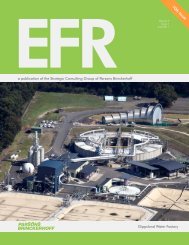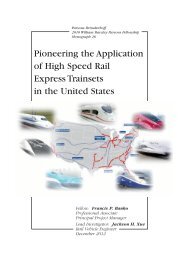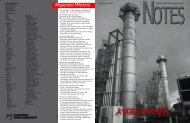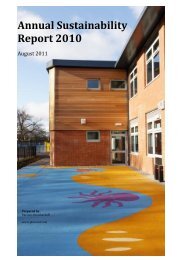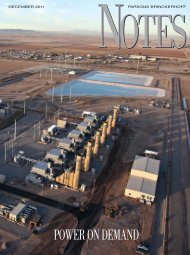Powering the Future Summary Report - Parsons Brinckerhoff
Powering the Future Summary Report - Parsons Brinckerhoff
Powering the Future Summary Report - Parsons Brinckerhoff
Create successful ePaper yourself
Turn your PDF publications into a flip-book with our unique Google optimized e-Paper software.
<strong>Powering</strong> <strong>the</strong> <strong>Future</strong> <strong>Summary</strong> <strong>Report</strong><br />
<strong>Powering</strong> <strong>the</strong> <strong>Future</strong> <strong>Summary</strong> <strong>Report</strong><br />
Large-scale conversion of road transport to biofuels<br />
is restricted by <strong>the</strong> available biomass that can be<br />
employed without affecting food production or causing<br />
environmental damage. We believe a limit of 5%<br />
biofuel content of transport fuels to be <strong>the</strong> highest<br />
sustainable level.<br />
Hydrogen storage with fuel cell electric power is<br />
an alternative to battery electric power for vehicles,<br />
although it offers a smaller CO 2 reduction and is not yet<br />
as advanced in development or readiness for largescale<br />
application. Hydrogen can be produced ei<strong>the</strong>r<br />
by electrolysis of water or by chemical processing of a<br />
hydrocarbon fuel, conventionally coal, for <strong>the</strong> scale of<br />
production needed for use as a transport fuel.<br />
Our analysis shows that hydrogen produced by<br />
electrolysis to supply vehicles using efficient fuel<br />
cells and electric drives requires two to three times<br />
<strong>the</strong> electricity needed to deliver <strong>the</strong> same energy to a<br />
battery-powered vehicle. This alternative is <strong>the</strong>refore<br />
not viable.<br />
Production of hydrogen by gasification of coal is a<br />
complex and energy-intensive process which includes<br />
<strong>the</strong> separation of a large proportion of <strong>the</strong> by-product<br />
CO 2 for storage. The hydrogen produced needs to<br />
be distributed through a new network of high-pressure<br />
pipelines to vehicle fuelling stations across <strong>the</strong> country.<br />
This costly infrastructure would commit <strong>the</strong> UK to<br />
increased dependency on fossil fuels and additional<br />
CO 2 emissions. This option is <strong>the</strong>refore excluded from<br />
fur<strong>the</strong>r consideration.<br />
Figure 6 Transport measures - net CO 2 reduction on sector emissions<br />
15:16



